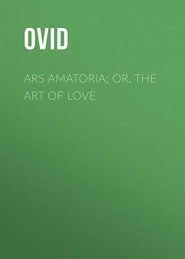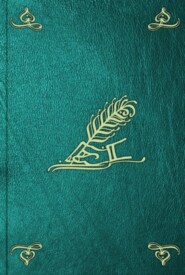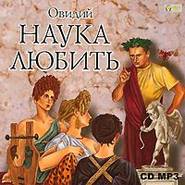По всем вопросам обращайтесь на: info@litportal.ru
(©) 2003-2024.
✖
The Amores; or, Amours
Настройки чтения
Размер шрифта
Высота строк
Поля
[ Off to the fields.—Ver. 19. The 'emeriti,' or veterans of the Roman legions, who had served their full time, received a regular discharge, which was called 'missio,' together with a bounty, either in money, or an allotment of land. Virgil was deprived of his property near Mantua, by the officers of Augustus; and in his first Eclogue, under the name of Tityrus, he relates how he obtained restitution of it on applying to the Emperor.]
393 (return (#x3_x_3_i64))
[ Free from the race.—Ver. 20. Literally, 'the starting place.']
394 (return (#x3_x_3_i64))
[ Wand of repose—Ver. 22. For an account of the 'rudis,' and the privilege it conferred, see the Tristia, Book, iv, El. 8. 1. 24.]
395 (return (#x3_x_3_i71))
[ Græcinus.—Ver. 1. He addresses three of his Pontic Epistles, namely, the Sixth of the First Book, the Sixth of the Second Book, and the Ninth of the Fourth Book, to his friend Græcinus. In the latter Epistle, he congratulates him upon his being Consul elect.]
396 (return (#x3_x_3_i71))
[ Without my arms.—Ver. 3. 'Inermis,' may be rendered, 'off my guard.']
397 (return (#x3_x_3_i71))
[ Like the skiff.—Ver. 10. 'Pliaselos' is perhaps here used as a general name for a boat or skiff; but the vessel which was particularly so called, was long and narrow, and probably received its name from its resemblance to a kidney-bean, which was called 'ptaselus.' The 'phaseli' were chiefly used by the Egyptians, and were of various sizes, from that of a mere boat to a vessel suited for a long voyage. Appian mentions them as being a medium between ships of war and merchant vessels. Being built for speed, they were more noted for their swiftness than for their strength. Juvenal, Sat. xv, 1. 127, speaks of them as being made of clay; but, of course, that can only refer to 'pha-seli' of the smallest kind.]
401 (return (#x3_x_3_i72))
[ That are thin.—Ver 23. The Poet was of slender figure.]
402 (return (#x3_x_3_i73))
[ Arm his breast —Ver. 31. He alludes to the 'lorica,' or cuirass, which was worn by the soldiers.]
403 (return (#x3_x_3_i73))
[ Of his battles.—Ver. 36. He probably was thinking at this moment of the deaths of Cornelius Gallus, and T. Haterius, of the Equcstriai order, whose singular end is mentioned by Valerius Maximus, 11. ix c. 12, s. 8, and by Pliny the Elder, B. vii., c. 53.]
404 (return (#x3_x_3_i77))
[ The meeting rocks.—Ver 3. See the 121st line of the Epistle of Medea to Jason, and the Note to the passage.]
405 (return (#x3_x_3_i79))
[ Tinted pebbles.—Ver. 13. The 'picti lapilli' are probably camelians, which are found on the sea shore, and are of various tints.]
406 (return (#x3_x_3_i79))
[ The recreation.—Ver. 14. 'Mora,' 'delay,' is put here for that which causes the delay. 'That is a pleasure which belongs to the shore.']
407 (return (#x3_x_3_i79))
[ In what Malea.—Ver. 20. Propertius and Virgil also couple Malea, the dangerous promontory on the South of Laconia, with the Syrtes or quicksands of the Libyan coast.]
409 (return (#x3_x_3_i80))
[ Stars of the fruitful Leda.—Ver. 29. Commentators are divided upon the exact meaning of this line. Some think that it refers to the Constellations of Castor and Pollux, which were considered to be favourable to mariners; and which Horace mentions in the first line of his Third Ode, B. i., 'Sic fratres Helenae, lucida sidera,' 'The brothers of Helen, those brilliant stars.' Others think that it refers to the luminous appearances which were seen to settle on the masts of ships, and were called by the name of Castor and Pollux; they were thought to be of good omen when both appeared, but unlucky when seen singly.]
410 (return (#x3_x_3_i80))
[ In the couch.—Ver. 31. 'Torus' most probably means, in this place a sofa, on which the ladies would recline while reading.]
411 (return (#x3_x_3_i80))
[ Amusing books.—Ver. 31. By using the diminutive 'libellus' here, he probably means some light work, such as a bit of court scandal, of a love poem.]
412 (return (#x3_x_3_i82))
[ My Divinities.—Ver. 44. See the Second Epistle, 1. 126, and the Note to the passage.]
413 (return (#x3_x_3_i82))
[ As a table.—Ver. 48. This denotes his impatience to entertain her once again, and to hear the narrative of her adventures.]
414 (return (#x3_x_3_i82))
[ Though they be fictions.—Ver. 53. He gives a sly hit here at the tales of travellers.]
415 (return (#x4_x_4_i3))
[ Twice five years.—Ver. 9. Or the 'lustrum' of the Romans, see the Fasti, Book iii. 1. 166, and the Tristia, Book iv. El. 10.]
416 (return (#x4_x_4_i4))
[ And the cause.—Ver. 17. This passage is evidently misunderstood in Nisard's translation, 'Je ne serai pas non plus la caus d'une nouvelle guerre,' 'I will never more be the cause of a new war.']
417 (return (#x4_x_4_i4))
[ A female again.—Ver. 22. He alludes to the war in Latium, between Æneas and Turnus, for the hand of Lavinia, the daughter of Latinus and Amata. See the narrative in the Fourteenth book of the Metamorphoses.]
421 (return (#x4_x_4_i4))
[ 'Twas the females—Ver. 23. The rape of the Sabines, by the contrivance of Romulus, is here alluded to. The narrative will be found in the Third Book of the Fasti, 1. 203, et seq. It has been suggested, but apparently without any good grounds, that Tarpeia is here alluded to.]
422 (return (#x4_x_4_i9))
[ Thou who dost.—Ver. 7. Io was said to be worshipped under the name of Isis.]
423 (return (#x4_x_4_i9))
[ Parætonium.—Ver. 7. This city was situate at the Canopic mouth of the Nile, at the Western extremity of Egypt, adjoining to Libya. According to Strabo, its former name was Ammonia. It still preserves its ancient name in a great degree, as it is called al-Baretoun.]
424 (return (#x4_x_4_i9))
393 (return (#x3_x_3_i64))
[ Free from the race.—Ver. 20. Literally, 'the starting place.']
394 (return (#x3_x_3_i64))
[ Wand of repose—Ver. 22. For an account of the 'rudis,' and the privilege it conferred, see the Tristia, Book, iv, El. 8. 1. 24.]
395 (return (#x3_x_3_i71))
[ Græcinus.—Ver. 1. He addresses three of his Pontic Epistles, namely, the Sixth of the First Book, the Sixth of the Second Book, and the Ninth of the Fourth Book, to his friend Græcinus. In the latter Epistle, he congratulates him upon his being Consul elect.]
396 (return (#x3_x_3_i71))
[ Without my arms.—Ver. 3. 'Inermis,' may be rendered, 'off my guard.']
397 (return (#x3_x_3_i71))
[ Like the skiff.—Ver. 10. 'Pliaselos' is perhaps here used as a general name for a boat or skiff; but the vessel which was particularly so called, was long and narrow, and probably received its name from its resemblance to a kidney-bean, which was called 'ptaselus.' The 'phaseli' were chiefly used by the Egyptians, and were of various sizes, from that of a mere boat to a vessel suited for a long voyage. Appian mentions them as being a medium between ships of war and merchant vessels. Being built for speed, they were more noted for their swiftness than for their strength. Juvenal, Sat. xv, 1. 127, speaks of them as being made of clay; but, of course, that can only refer to 'pha-seli' of the smallest kind.]
401 (return (#x3_x_3_i72))
[ That are thin.—Ver 23. The Poet was of slender figure.]
402 (return (#x3_x_3_i73))
[ Arm his breast —Ver. 31. He alludes to the 'lorica,' or cuirass, which was worn by the soldiers.]
403 (return (#x3_x_3_i73))
[ Of his battles.—Ver. 36. He probably was thinking at this moment of the deaths of Cornelius Gallus, and T. Haterius, of the Equcstriai order, whose singular end is mentioned by Valerius Maximus, 11. ix c. 12, s. 8, and by Pliny the Elder, B. vii., c. 53.]
404 (return (#x3_x_3_i77))
[ The meeting rocks.—Ver 3. See the 121st line of the Epistle of Medea to Jason, and the Note to the passage.]
405 (return (#x3_x_3_i79))
[ Tinted pebbles.—Ver. 13. The 'picti lapilli' are probably camelians, which are found on the sea shore, and are of various tints.]
406 (return (#x3_x_3_i79))
[ The recreation.—Ver. 14. 'Mora,' 'delay,' is put here for that which causes the delay. 'That is a pleasure which belongs to the shore.']
407 (return (#x3_x_3_i79))
[ In what Malea.—Ver. 20. Propertius and Virgil also couple Malea, the dangerous promontory on the South of Laconia, with the Syrtes or quicksands of the Libyan coast.]
409 (return (#x3_x_3_i80))
[ Stars of the fruitful Leda.—Ver. 29. Commentators are divided upon the exact meaning of this line. Some think that it refers to the Constellations of Castor and Pollux, which were considered to be favourable to mariners; and which Horace mentions in the first line of his Third Ode, B. i., 'Sic fratres Helenae, lucida sidera,' 'The brothers of Helen, those brilliant stars.' Others think that it refers to the luminous appearances which were seen to settle on the masts of ships, and were called by the name of Castor and Pollux; they were thought to be of good omen when both appeared, but unlucky when seen singly.]
410 (return (#x3_x_3_i80))
[ In the couch.—Ver. 31. 'Torus' most probably means, in this place a sofa, on which the ladies would recline while reading.]
411 (return (#x3_x_3_i80))
[ Amusing books.—Ver. 31. By using the diminutive 'libellus' here, he probably means some light work, such as a bit of court scandal, of a love poem.]
412 (return (#x3_x_3_i82))
[ My Divinities.—Ver. 44. See the Second Epistle, 1. 126, and the Note to the passage.]
413 (return (#x3_x_3_i82))
[ As a table.—Ver. 48. This denotes his impatience to entertain her once again, and to hear the narrative of her adventures.]
414 (return (#x3_x_3_i82))
[ Though they be fictions.—Ver. 53. He gives a sly hit here at the tales of travellers.]
415 (return (#x4_x_4_i3))
[ Twice five years.—Ver. 9. Or the 'lustrum' of the Romans, see the Fasti, Book iii. 1. 166, and the Tristia, Book iv. El. 10.]
416 (return (#x4_x_4_i4))
[ And the cause.—Ver. 17. This passage is evidently misunderstood in Nisard's translation, 'Je ne serai pas non plus la caus d'une nouvelle guerre,' 'I will never more be the cause of a new war.']
417 (return (#x4_x_4_i4))
[ A female again.—Ver. 22. He alludes to the war in Latium, between Æneas and Turnus, for the hand of Lavinia, the daughter of Latinus and Amata. See the narrative in the Fourteenth book of the Metamorphoses.]
421 (return (#x4_x_4_i4))
[ 'Twas the females—Ver. 23. The rape of the Sabines, by the contrivance of Romulus, is here alluded to. The narrative will be found in the Third Book of the Fasti, 1. 203, et seq. It has been suggested, but apparently without any good grounds, that Tarpeia is here alluded to.]
422 (return (#x4_x_4_i9))
[ Thou who dost.—Ver. 7. Io was said to be worshipped under the name of Isis.]
423 (return (#x4_x_4_i9))
[ Parætonium.—Ver. 7. This city was situate at the Canopic mouth of the Nile, at the Western extremity of Egypt, adjoining to Libya. According to Strabo, its former name was Ammonia. It still preserves its ancient name in a great degree, as it is called al-Baretoun.]
424 (return (#x4_x_4_i9))














